In the world of eCommerce, two platforms have seen a rapid rise in a short time – Temu and Shein.
Temu is a new name in the online shopping industry, while Shein has been conquering the industry for the last 15 years. However, seeing the rising popularity and customer base, Temu has become the number one contender to many online shopping marketplaces, including Shein.
That’s why I have decided to compare both Temu and Shein side by side. This in-depth comparison will help you make an informed decision while shopping online from either of them.
Let’s get started.
Temu vs Shein: In A Nutshell (2025)
Here is a quick comparison table of Temu and Shein that will help you compare both platforms on the go.
| Features | Temu | Shein |
| Business Model | Online Marketplace | Fashion Retailer |
| Product Range | 100+ | 200+ |
| Discounts | Upto 90% | Up to 50% (depending on the sale) |
| Shipping Times | 7-15 days | 7-21 days |
| Return Policy | 90 days | 45 days |
| Customer Service | Multiple ways to contact | Completely automated |
| Payment Options | Multiple payment options | Multiple payment options |
What Is Temu?
Temu is a US-based online marketplace owned by a famous Chinese company, PDD Holdings. Basically, they run businesses in major US and European countries while connecting third-party sellers to consumers.
The company was launched in September 2022 but soon became popular among retailers. The reason is its vast product selection and unimaginable prices. Temu positions itself as an online megastore that makes luxury products accessible to the average consumer.
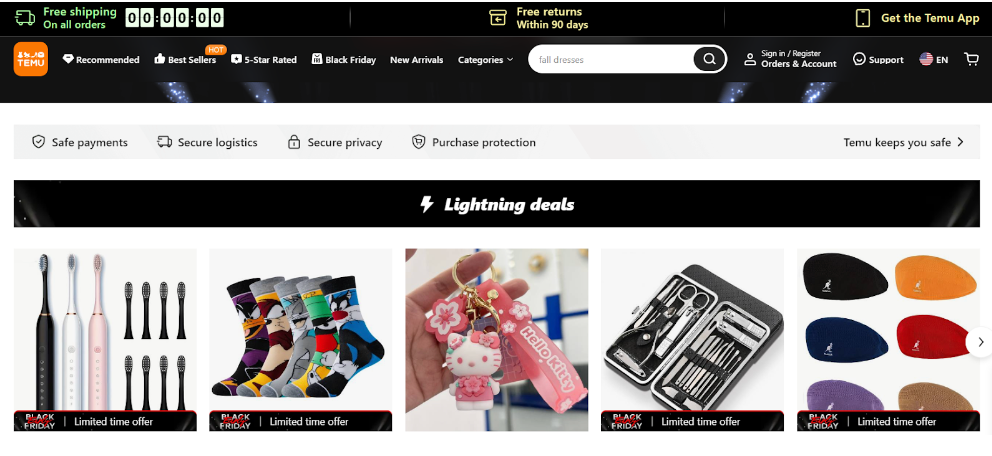
Moreover, they have a mobile app with 17 million active monthly users. Within its launch, the app crossed over 100 million downloads in a few months.
Bonus: Check out our detailed Temu review and find out every detail of this lightning-fast online marketplace.
What Is Shein?
Shein is a Chinese fast fashion eCommerce company that has been offering highly affordable clothing and accessories since 2008. Soon after its launch, the company became one of the biggest names in the fashion industry.
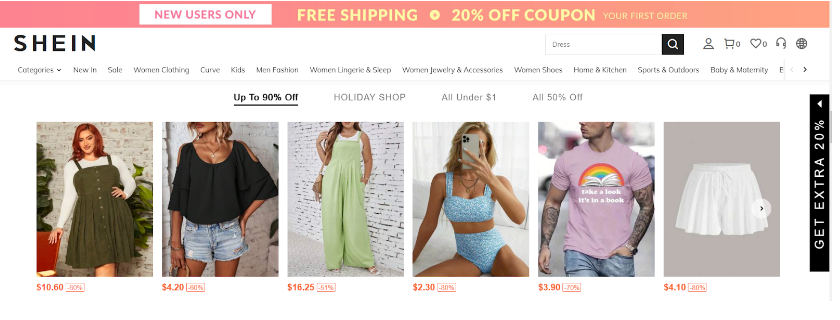
Shein adopts an ultra-fast supply chain and free shipping marketing tactics to attract customers. The company produces small batches of thousands of new styles every day. Many buyers claim that the company replicates current fashion apparel at lightning speed.
Shein mainly relies on social media marketing, such as videos on Instagram and leveraging influencer programs on TikTok & YouTube.
Temu vs Shein: Major Features Comparison
Let’s do a detailed comparison of Temu and Shein across several parameters to understand their key similarities and differences:
1. UI & UX
Temu has a similar interface to Amazon. There are multiple sections showcasing top deals, discounts, and products. The homepage is neat, with clear navigation to various categories.
The app provides a personalized experience through curated product recommendations. Overall, navigation is smooth, and the listings are well-organized. Customers have praised the ease of browsing on Temu.
Shein also has a sleek and visually optimized interface for fashion discovery. The homepage displays the latest arrivals, trending, and recommended styles. Aesthetic product images and minimalist design create an engaging experience for users.
Shein also offers curated recommendations through its algorithm. The focus of the platform is to guide users in discovering and purchasing styles tailored to their tastes.
Winner: Tie. Both Temu and Shein provide almost similar interfaces with a discovery-based browsing option.
2. Product Selection
Temu has over 100 categories, including fashion, electronics, home appliances, pet supplies, gadgets and more. The goal is to make every kind of product available at cut-rate prices.
If we talk about fashion, Temu offers a huge range of clothing, shoes, jewelry, and accessories across styles, including casual, formal, sports, and plus-size ranges.
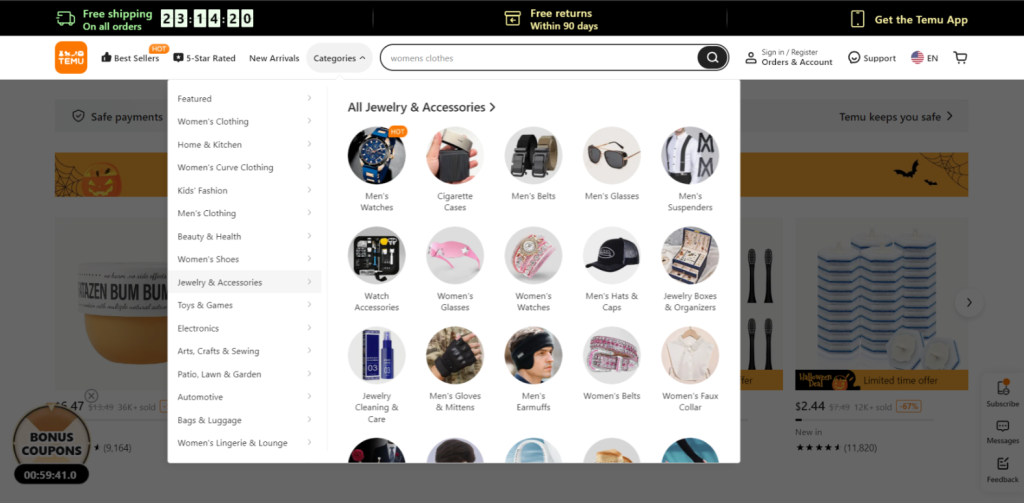
Shein mainly focuses on women’s fashion, including dresses, tops, bottoms, shoes, accessories, and jewelry. The styles are highly trendy and aligned with current fashion.
Apart from fashion, Shein also has 200+ product categories covering every essential product. They also add new items to their catalog that you can access from the “New Arrivals” section.
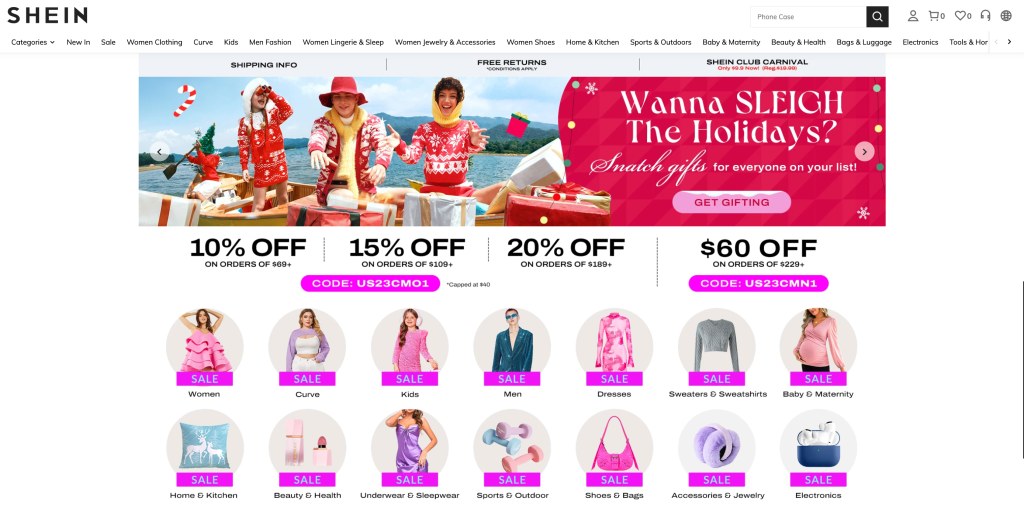
Winner: Tie. Both platforms offer a vast range of product categories for their customers. However, Shein’s main attraction is women’s fashion, while Temu goes beyond fashion.
3. Product Quality
Temu claims to offer quality items at discounted prices. However, user reviews are mixed. Some have praised the decent quality for low prices, while others find it hit or miss.
As Temu hosts third-party sellers, quality control is not consistent. Items may be unbranded or questionable in terms of durability.
In Shein’s case, the same concerns arise. Their product quality is controversial. Most clothes are made from polyester and cheap fabrics.
While their affordable products may not last through many wears and washes, they still have decent reviews for quality, considering the low prices.
Winner: For both Temu and Shein, product quality can be a huge issue for businesses who are looking to resell products.
4. Pricing
Ultra-low pricing is one of Temu’s biggest unique selling propositions. The company offers up to 90% discounts on retail prices. Products are priced at wholesale rates, allowing shoppers to access bargain deals.
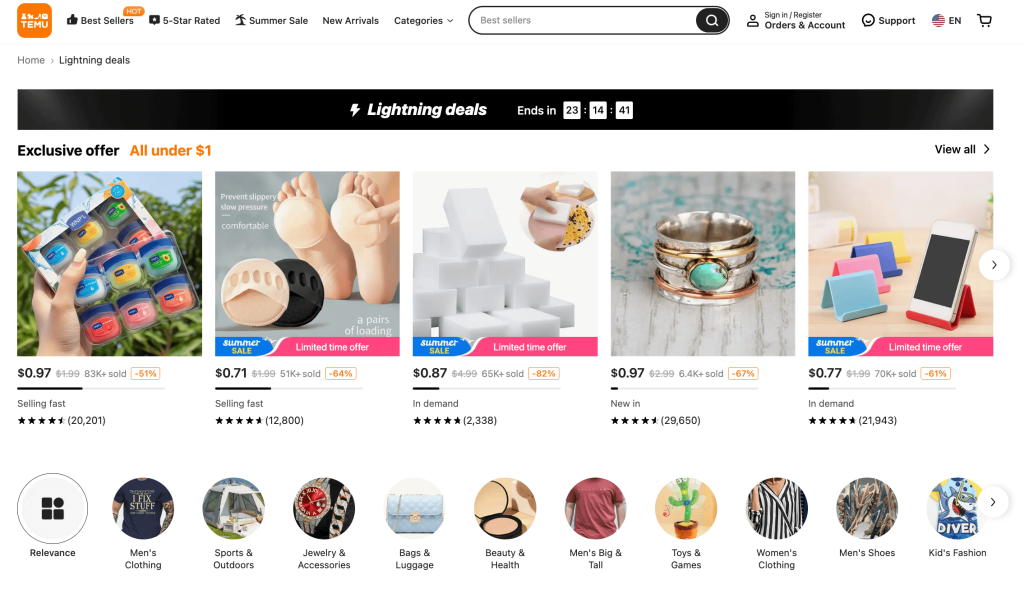
With bundle deals on multiple items, fashion items and other accessories are priced under $10-$15. Even bigger ticket products are available at significant price cuts compared to other eCommerce sites.
Shein is also extremely competitive when it comes to pricing. Trending clothes and apparel are priced under $20. Users can get a flat discount on orders crossing a certain threshold.
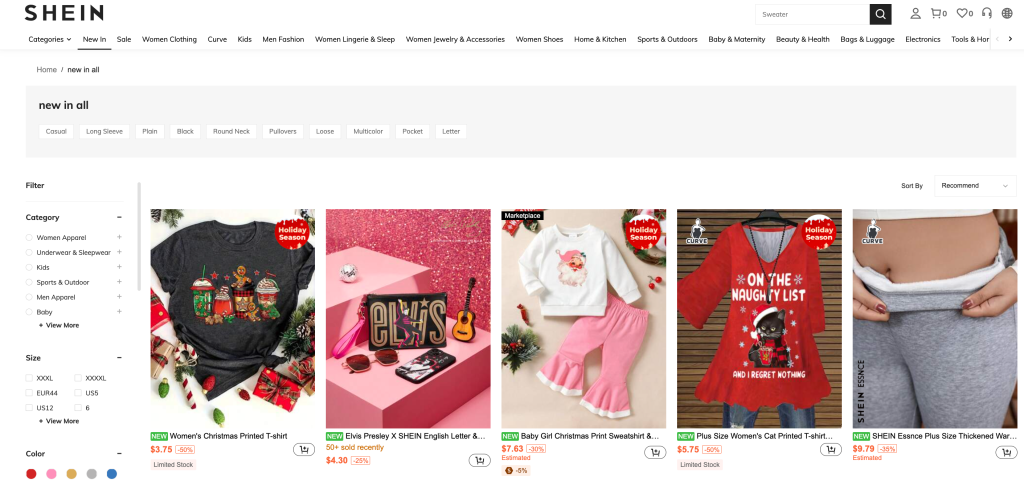
Many competitors find it difficult to match Shein’s prices. This is the reason many fashion dropshippers and arbitrage businesses prefer sourcing from the website.
Winner: Temu is a little bit ahead of Shein when it comes to offering rock-bottom pricing.
5. Shipping Times
Temu offers free shipping on most products, which helps enhance affordability. Standard shipping times are 7-15 days, which is relatively faster compared to platforms shipping inventory directly from China.
Some customers have received their orders within a week, while others report 3-4 weeks delays. Shipping can also be impacted due to unverified sellers in Temu. So make sure to check reviews on their profile before ordering a batch from them.
Shein also delivers products within a given timeframe of 7-21 days. If you go for the free shipping option, it can take forever to receive your order. However, with the paid options, they ship orders on priority.
Shein doesn’t have many US or UK warehouses, so direct shipping from China can take time. However, assessing the supplier’s shipping timeline is of the essence.
Winner: Temu is slightly faster than Shein because they locally operate in many US and UK regions.
6. Discounts
Temu promotes heavy discounts of up to 90% as a key attraction. Special markdowns and flash sales offer products at even lower prices.
Free coupons and bonus cashback rewards are provided frequently. Occasional giveaways of free products and gift cards also attract shoppers. Limited-time discounts drive sales events.
Shein follows a discount-driven model, offering promotions on the website daily. First-time shoppers get additional discounts. Retail holidays and pop-up sales with sitewide promo codes are used to boost orders.
Influencer marketing campaigns and referral codes also give followers special discounts. Loyalty programs offer free shipping and other perks.
Winner: Tie. Both platforms run promotions, discounts, and incentives aggressively. Temu’s ‘Shop like a Billionaire’ pitch relies heavily on deals, while Shein’s giveaways also target influencer followers.
7. Refund & Return Policy
Temu offers returns within 90 days of purchase if the customer is unsatisfied. Return shipping labels can be easily printed, and items can be shipped back for free.
Refunds are smoothly processed upon return receipt. No return authorization is required, which simplifies the process. Exchanges are also permitted.
Shein has a standard return window of 45 days. Return shipping has to be paid by the customer unless the return is due to an error by Shein. A return authorization must first be requested.
Once Shein receives the returned product, refunds are issued within a few days. Exchanges can be made for alternative sizes or items.
Winner: Temu edges ahead with its longer and more flexible return policy. Shein has stricter return limitations and a shorter window as per industry standards.
8. Customer Service
Temu offers its customers a personalized experience. If you receive your product very late, you will receive $5 to $10 as compensation.
As common compensation, Temu offers store credit or small partial refunds for issues faced. Support is provided via email with average resolution times.
Shein predominantly relies on chatbots, but live chat options are also available. However, reviews often complain of delayed or automated replies from customer service.
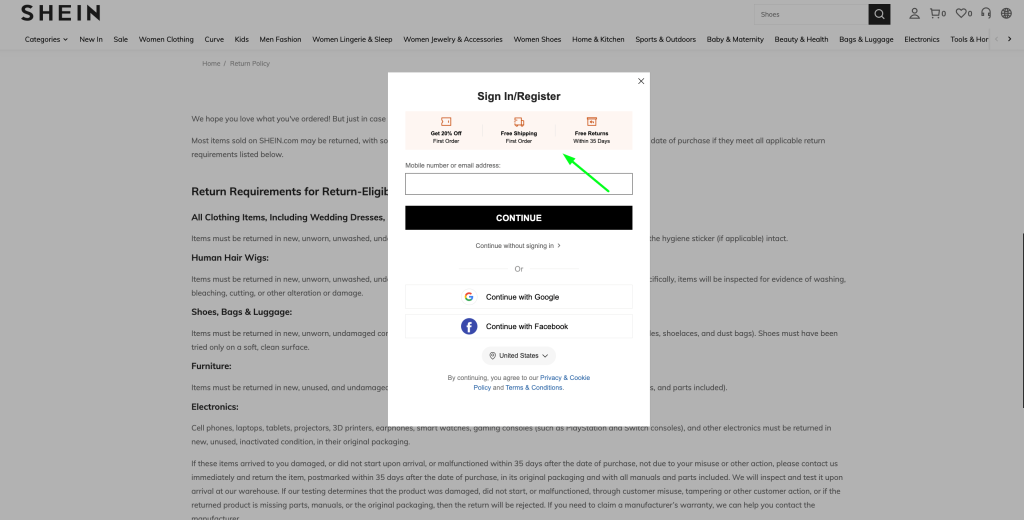
Winner: Temu provides the ultimate solutions to users’ queries, while Shein’s customer service lacks drastically.
9. Payment & Security
Temu allows payments via credit cards, Apple Pay, PayPal, and Afterpay services. Users mention smooth and glitch-free payment processing while purchasing from the platform.
The platform uses secure encryption and protocols to process transactions without the risk of fraud or leaks.
Shein also offers payments through credit cards, PayPal, and Buy Now Pay Later services. The payment system on the platform is safeguarded through layers of security and encryption.
Winner: Tie. Temu and Shein both offer multiple payment methods and security to users for smooth transactions.
10. Customization
When comparing Temu and Shein, customization options significantly differ, impacting user experience and product personalization.
Temu offers a moderate level of customization, focusing on allowing users to personalize their shopping experience through tailored recommendations and some customizable product options. This platform primarily emphasizes user preferences and browsing history to enhance shopping convenience.
Shein, on the other hand, excels in customization, particularly with its extensive range of customizable clothing options. Users can select different sizes, colors, and styles and even utilize virtual try-on features to ensure a perfect fit. Shein’s user-centric approach extends to frequent surveys and feedback mechanisms, which influence product offerings and customization features.
Winner: Shein
Temu vs Shein – Market Potential
Temu and Shein are two rapidly growing e-commerce platforms with distinct market potentials. Temu targets a broader audience with a wide range of affordable products, including fashion, electronics, and home goods. This diversity allows Temu to attract a wide customer base, particularly in price-sensitive markets.
Shein, on the other hand, focuses heavily on fast fashion, appealing to younger demographics with its trendy and frequently updated product offerings. Its strong social media presence and influencer partnerships boost its brand visibility, making it a go-to platform for fashion-conscious consumers.
In terms of market potential, Shein’s niche in the fast fashion industry gives it a competitive edge in markets where trends drive purchasing decisions. Temu’s diversified product range, however, positions it well for growth in broader e-commerce markets, especially in emerging economies where consumers are looking for a variety of affordable options. Both platforms are poised for significant growth, but their strategies and target markets will determine their long-term success.
Temu vs Shein: Which One Is Best For Dropshipping?
Temu operates as a marketplace with independent sellers. So, dropshipping arrangements are not offered officially. However, sellers can source inventory in bulk and sell in physical stores and local marketplaces for a profit.
Shein, on the other hand, allows dropshipping on its platform. You can either apply for the Partner Program or contact suppliers for dropshipping. You can purchase directly from authorized partners and get a discount on wholesale pricing.
Shein can be an ideal clothing dropshipping supplier, as it offers an unlimited range of trending outfits and apparel. With its product handling and fulfillment process, you can easily make passive income from your home.
Final Verdict: Temu Offers Affordable Pricing Compared To Shein
While Temu and Shein share a lot of similarities, they are quite different in many terms. Temu is a great marketplace for finding different items at cheap rates, while Shein is a hub for trending and on-demand clothing.
However, Temu is the utmost winner of this head-to-head battle. The platform beats Shein on many aspects, such as pricing, shipping, and customer service.
Ultimately, the choice between the platforms depends on individual shoppers’ preferences for price, quality, and convenience.
If you just want to source products at reasonable rates, Temu is undoubtedly the right pick. But when it comes to clothing and dropshipping, Temu is no match for Shein.
FAQs On Temu vs Shein
Temu focuses only on apparel and accessories, while Shein offers a wider range of products, including home goods, beauty products, etc. Temu’s prices are generally lower than Shein’s. Shein is a more established brand compared to the newer Temu.
Shein offers a wider range of products across categories like apparel, accessories, home goods, beauty etc. Temu only focuses on clothing and accessories.
Temu generally has better pricing and offers products at lower prices than Shein.
Both platforms offer free international shipping, but Shein may have faster-estimated delivery times on average compared to Temu.
There is no clear winner, as it depends on individual needs and preferences. If price is the top priority, Temu may be better. If the variety of product categories is important, Shein has an edge. Both are good budget-friendly options for online fashion and accessories.
- Shopify Pricing 2025: Which Plan Is The Best For You? - July 31, 2025
- How To Remove Powered By Shopify (2025 Guide) - July 31, 2025
- Temu vs Shein (2025) — Quality, Shipping & Pricing Differences - July 18, 2025

